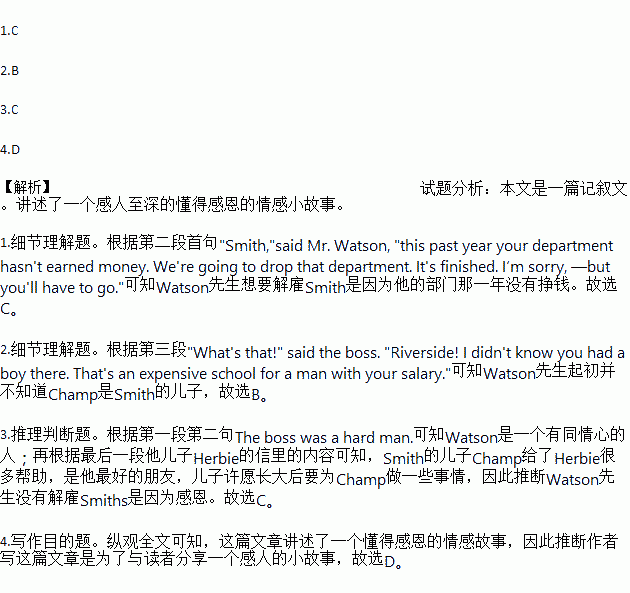题目内容
Smith entered Mr. Watson's office. The boss was a hard man. He fired people who didn't do well without giving them a second chance.
"Smith,"said Mr. Watson," this past year your department hasn't earned money. We're going to drop that department. It's finished. I'm sorry, but you'll have to go.""But, sir, if I just had a little more time. For the moment I need the job to keep my son at Riverside School."
"What's that!" said the boss. "Riverside!I didn't know you had a boy there. That's an expensive school for a man with your salary."
"I know,sir. But he likes it there so much!He's a star athlete and the best boxer in the school. The boys call him Champ(冠军) there."
The boss sat perfectly still for a long time---a faraway(恍惚的) look in his eyes. Then, suddenly, he said,"We've got to close your department, Smith. But you'll take over a new job in another department. It means longer hours, maybe more pay. Now get out.You're here for life."
Smith got out, with surprise on his face.Then the boss took a letter from the top drawer of his desk. It was Herbie's last letter from Riverside School written a few days before he died. He had read it over and over again with sick pain.
The letter read:
I can't say the boys here are any nicer to me than the others were. I guess it's the same everywhere when you're a cripple(跛脚的人). But don't worry about me, Dad. They've got a good chemistry department here. And there's one boy here who is really great. He's a track star and boxing champ and just tops in chemistry.The boys call him Champ. He made them stop throwing my books around. And he knocked a boy down who hit me. He is the best friend I ever had. Dad, when I grow up, I want to do something for Champ. Something big that he won't even know about.
1.Mr.Watson wanted to fire Smith because ______ .
A. Smith would take over a new job in another department.
B. Smith's son knocked a boy down who hit Herbie.
C. Smith's department didn't earn money that year.
D. Smith had his son study in Riverside School.
2.We can learn from the text that ______ .
A. Mr.Watson wanted to realize Champ's dream.
B. Mr.Watson didn't know that Champ was Smith's son at first.
C. Mr.Watson decided to give Smith another chance in no time.
D. Mr.Watson was told not to fire Smith by Herbie.
3.According to the text,which words can best describe Mr.Watson? ______
A. Easy-going and optimistic. B. Hardworking and sympathetic.
C. Strict and grateful. D. Selfish and greedy.
4.The author wrote the text in order to ______ .
A. help us to deal with our boss B. make our children enjoy life
C. provide us with tips on work D. share a moving story with us
 阅读快车系列答案
阅读快车系列答案
